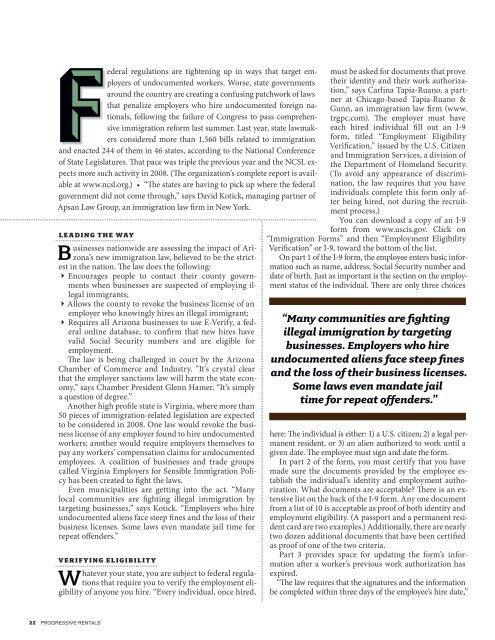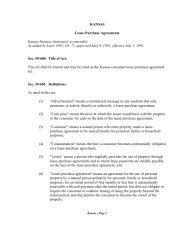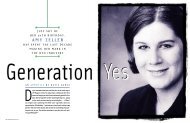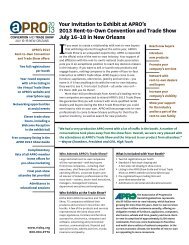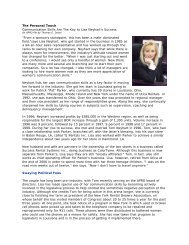Hiring - APRO
Hiring - APRO
Hiring - APRO
- No tags were found...
Create successful ePaper yourself
Turn your PDF publications into a flip-book with our unique Google optimized e-Paper software.
Federal regulations are tightening up in ways that target employersof undocumented workers. Worse, state governmentsaround the country are creating a confusing patchwork of lawsthat penalize employers who hire undocumented foreign nationals,following the failure of Congress to pass comprehensiveimmigration reform last summer. Last year, state lawmakersconsidered more than 1,560 bills related to immigrationand enacted 244 of them in 46 states, according to the National Conferenceof State Legislatures. That pace was triple the previous year and the NCSL expectsmore such activity in 2008. (The organization’s complete report is availableat www.ncsl.org.) • “The states are having to pick up where the federalgovernment did not come through,” says David Kotick, managing partner ofApsan Law Group, an immigration law firm in New York.Leading the wayBusinesses nationwide are assessing the impact of Arizona’snew immigration law, believed to be the strictestin the nation. The law does the following: Encourages people to contact their county governmentswhen businesses are suspected of employing illegalimmigrants; Allows the county to revoke the business license of anemployer who knowingly hires an illegal immigrant; Requires all Arizona businesses to use E-Verify, a federalonline database, to confirm that new hires havevalid Social Security numbers and are eligible foremployment.The law is being challenged in court by the ArizonaChamber of Commerce and Industry. “It’s crystal clearthat the employer sanctions law will harm the state economy,”says Chamber President Glenn Hamer. “It’s simplya question of degree.”Another high profile state is Virginia, where more than50 pieces of immigration-related legislation are expectedto be considered in 2008. One law would revoke the businesslicense of any employer found to hire undocumentedworkers; another would require employers themselves topay any workers’ compensation claims for undocumentedemployees. A coalition of businesses and trade groupscalled Virginia Employers for Sensible Immigration Policyhas been created to fight the laws.Even municipalities are getting into the act. “Manylocal communities are fighting illegal immigration bytargeting businesses,” says Kotick. “Employers who hireundocumented aliens face steep fines and the loss of theirbusiness licenses. Some laws even mandate jail time forrepeat offenders.”Verifying eligibilityWhatever your state, you are subject to federal regulationsthat require you to verify the employment eligibilityof anyone you hire. “Every individual, once hired,must be asked for documents that provetheir identity and their work authorization,”says Carlina Tapia-Ruano, a partnerat Chicago-based Tapia-Ruano &Gunn, an immigration law firm (www.trgpc.com). The employer must haveeach hired individual fill out an I-9form, titled “Employment EligibilityVerification,” issued by the U.S. Citizenand Immigration Services, a division ofthe Department of Homeland Security.(To avoid any appearance of discrimination,the law requires that you haveindividuals complete this form only afterbeing hired, not during the recruitmentprocess.)You can download a copy of an I-9form from www.uscis.gov. Click on“Immigration Forms” and then “Employment EligibilityVerification” or I-9, toward the bottom of the list.On part 1 of the I-9 form, the employee enters basic informationsuch as name, address, Social Security number anddate of birth. Just as important is the section on the employmentstatus of the individual. There are only three choices“Many communities are fightingillegal immigration by targetingbusinesses. Employers who hireundocumented aliens face steep finesand the loss of their business licenses.Some laws even mandate jailtime for repeat offenders.”here: The individual is either: 1) a U.S. citizen; 2) a legal permanentresident, or 3) an alien authorized to work until agiven date. The employee must sign and date the form.In part 2 of the form, you must certify that you havemade sure the documents provided by the employee establishthe individual’s identity and employment authorization.What documents are acceptable? There is an extensivelist on the back of the I-9 form. Any one documentfrom a list of 10 is acceptable as proof of both identity andemployment eligibility. (A passport and a permanent residentcard are two examples.) Additionally, there are nearlytwo dozen additional documents that have been certifiedas proof of one of the two criteria.Part 3 provides space for updating the form’s informationafter a worker’s previous work authorization hasexpired.“The law requires that the signatures and the informationbe completed within three days of the employee’s hire date,”22 PROGRESSIVE RENTALS


